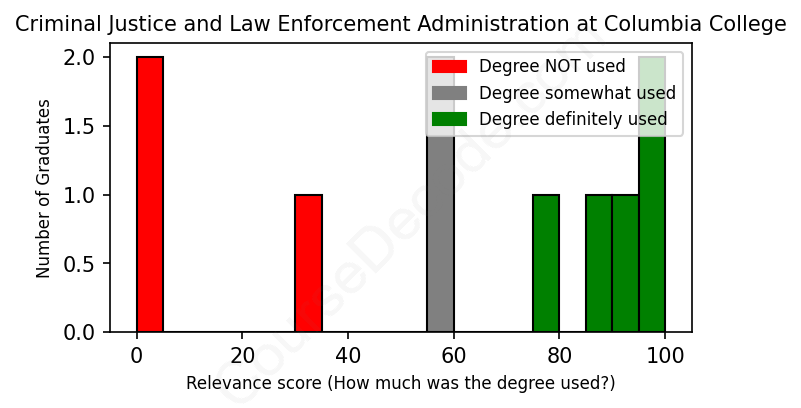
First, some facts. Of the Criminal Justice and Law Enforcement Administration graduates from Columbia College we've analyzed , here's how many have used (or NOT used) their degree in their career:

These are estimates based on AI analysis of 10 LinkedIn profiles (see below).
The verdict? Below average. Overall, with an average relevance score of 59%, Criminal Justice and Law Enforcement Administration graduates from Columbia College have a lower likelihood (-8%) of finding work in this field compared to the average graduate across all fields:
And for comparison, here's the chart for all profiles we've looked at across all degrees.
Also, after graduating, 50% of these graduates have pursued further education other than another Bachelor's degree (such as a Masters degree or other), compared to the average across all profiles of 35%. This suggests you may need more than just a Bachelors degree to be competitive as a Criminal Justice and Law Enforcement Administration graduate.
See the details:
|
Relevance score: 98% We think this person has gone into a career highly relevant to their degree. We think this person has gone into a career highly relevant to their degree.
DEGREE INFOGraduated in 2015 from Columbia College with a Bachelor of Arts (BA) in Criminal Justice and Law Enforcement Administration. Also pursued further education since (see below). JOB HISTORY SINCE GRADUATIONDetention Officer Madison County Sheriff's Department Apr 2015 - 2015 CPO  G4S Jul 2015 - Oct 2015 Crime Gun Intelligence Coordinator Level 2B/Team Lead  Eagle Harbor, LLC Oct 2015 - Present FURTHER DEGREES DONE SINCE GRADUATINGCybersecurity BootcampDrake State Community and Technical College 2024 - 2024 ABOUTWould you like me to give you a formula for success? It's quite simple, really: Double your rate of failure. You are thinking of failure as the enemy of success. But it isn't at all. You can be discouraged by failure or you can learn from it, so go ahead and make mistakes. Make all you can. Because remember that's where you will find success. Thomas J. Watson |
The top 10 most common jobs done by the graduates we've analyzed (ranked most common to least) are:
From the analysis of LinkedIn profiles of graduates from Columbia College with a degree in Criminal Justice and Law Enforcement Administration, it looks like the most common jobs held by these individuals include roles in security, law enforcement, and legal support. Many have found their way into positions like Detention Officer, Crime Gun Intelligence Coordinator, and Antiterrorism Officer, where they are able to apply their knowledge of criminal justice principles in practical, everyday settings. These positions are directly aligned with their degree, allowing them to engage with the core concepts of law enforcement and public safety effectively.
On the flip side, there are also quite a few graduates who have ventured into unrelated fields such as administrative roles and real estate. Jobs like Executive Assistant, Virtual Administrative Specialist, and Realtor appear to lack a strong connection to the principles learned in their criminal justice studies. While many of these positions still involve skills like organization and management, they don’t fundamentally require the specialized knowledge that comes with a degree in Criminal Justice and Law Enforcement Administration. Overall, it seems that while there's a decent number of graduates in relevant positions, a significant portion has strayed into roles that don’t utilize their education directly.
Here is a visual representation of the most common words in job titles for Criminal Justice and Law Enforcement Administration graduates (this is across all Criminal Justice and Law Enforcement Administration graduates we've analyzed, not just those who went to Columbia College):

Looking at the career paths of graduates with a degree in Criminal Justice and Law Enforcement Administration from Columbia College, it seems like many of them start in roles that are directly related to security and law enforcement. For instance, some graduates began their careers as security officers or even in military roles shortly after graduation. This immediate involvement in the field suggests that the degree provides a strong foundation for entry-level positions in law enforcement and security. As time goes on, many of those who began in security roles seem to progress into managerial positions or specialized roles. For example, a few have moved from being a detention officer to higher-level roles, such as Crime Gun Intelligence Coordinator or even operations management positions within the military. This trend definitely indicates that an initial grounding in security or law enforcement can lead to more advanced and varied opportunities.
However, it's also worth noting that not all paths have remained strictly within the realm of Criminal Justice. Some graduates have ventured into areas like administration and project management, which may not be directly tied to their degrees. While they may still be utilizing skills gained from their studies, such as organizational and critical thinking skills, their roles might not reflect the traditional expectations one might have after pursuing this degree. Over 5 to 10 years post-graduation, the diversity of career trajectories suggests that while many found success in relevant fields, others have pivoted to different industries entirely, which could indicate a mix of outcomes. Overall, it appears that graduates are experiencing a range of successes, with a notable portion sticking to careers relevant to their studies, while some have branched out into unrelated fields.
Honestly, a Bachelor's degree in Criminal Justice and Law Enforcement Administration, whether at Columbia College or elsewhere, is generally considered to be on the easier side compared to some more intense programs like engineering or the hard sciences. You’ll be diving into subjects like criminal law, ethics, and sociology, which tend to be pretty manageable if you’re organized and willing to put in some effort. There's definitely critical thinking and some writing involved, but most students find it pretty straightforward, especially if you have a genuine interest in the field. So, if you're passionate about criminal justice, you might enjoy the classes without feeling overwhelmed!
Most commonly, in the LinkedIn profiles we've looked at, it takes people 4 years to finish a Bachelor degree in Criminal Justice and Law Enforcement Administration.
Looking at the jobs of these Columbia College grads, it seems like they’ve had a mix of okay and pretty good earning potential, depending on the pathway they've chosen. The guy who started as a Security Officer and moved up to an Asset Protection Manager probably saw a nice salary boost over time, which is great. The US Army folks likely have decent pay and benefits, especially with their various roles, not to mention the added experience that looks impressive on a resume. The ones in administrative roles seem to be getting their foot in the door and building their careers, which can lead to higher salaries in the future. However, some roles like detention officers or basic security jobs might not pay as well, especially when starting out. Overall, it looks like some are on the upward trend regarding income, but there’s definitely a mix and not everyone is raking it in.
Here is a visual representation of the most common words seen in the "about" section of LinkedIn profiles who have a Bachelor degree in Criminal Justice and Law Enforcement Administration (this is across all Criminal Justice and Law Enforcement Administration graduates we've analyzed, not just those who went to Columbia College). This may or may not be useful:

Here are all colleges offering a Bachelor degree in Criminal Justice and Law Enforcement Administration (ordered by the average relevance score of their Criminal Justice and Law Enforcement Administration graduates, best to worst) where we have analyzed at least 10 of their graduates:
| College | Score | Count |
|---|---|---|
 American Military University American Military University
|
81 | 10 |
 Columbia Southern University Columbia Southern University
|
70 | 16 |
 Western Illinois University Western Illinois University
|
63 | 20 |
 Columbia College Columbia College
|
59 | 10 |
 John Jay College (CUNY) John Jay College (CUNY)
|
57 | 11 |
 University of Phoenix University of Phoenix
|
54 | 88 |
 Florida International University Florida International University
|
53 | 13 |
 Park University Park University
|
53 | 23 |
 Virginia Commonwealth University Virginia Commonwealth University
|
34 | 10 |